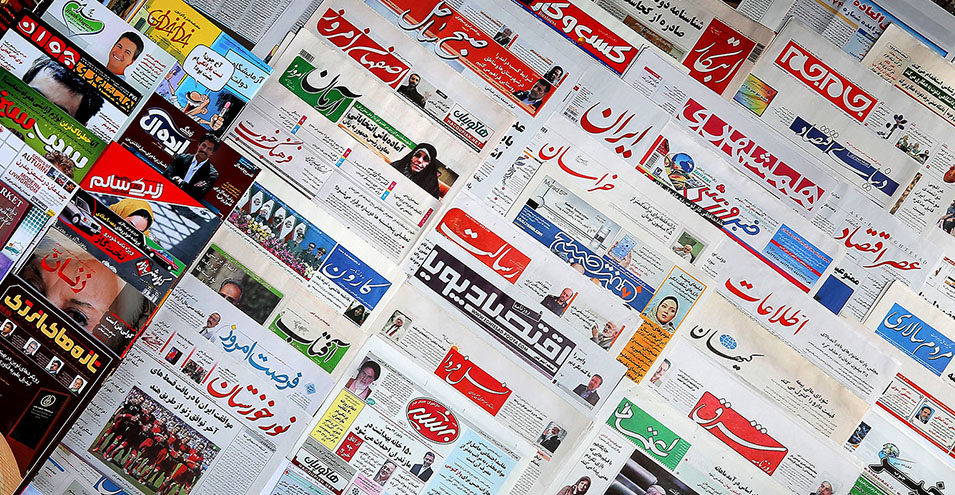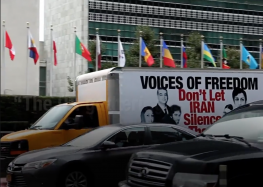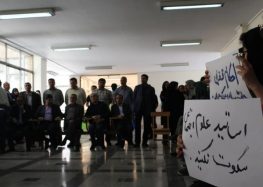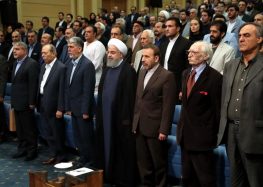Rouhani Press Bills Would Further Erode Press Freedom in Iran

Experts Suspect Intelligence Establishment’s Direct Influence
The government of President Hassan Rouhani is preparing to introduce two bills to Parliament that media experts and journalists say could further erode press freedom and freedom of expression in Iran. The first bill is designed to replace the current Press Law and the second would create a state organization to rival independent journalism groups.
“[The Media Affairs Commission] bill aims to bring all media outlets and journalists under direct state control,” said Mehdi Rahmanian, the editor-in-chief of the reformist Shargh newspaper, on August 16, 2016, according to the semi-official Iranian Labor News Agency (ILNA).
Media expert Kasra Nouri also told ILNA on August 16 that elements of the bill indicate that the intelligence establishment—which includes the Intelligence Ministry, the Revolutionary Guard’s Intelligence Organization, the police forces, and national security organizations—had a hand in drafting it.
“When the state writes the Code of Conduct for members of an independent profession, it will try to dominate and limit their freedoms,” Aboutorab Fazel, a reformist political activist, told ILNA on August 22, 2016. “All journalists would have to start preparing to defend their actions.”
“The Comprehensive Mass Media Regulatory Plan will be introduced as a bill to reform the Press Law and is designed to prevent many of the problems facing media publishers that sometimes result in the closure of newspapers or the arrest of journalists. There is also a need to introduce changes to incorporate digital media,” said the minister of culture and Islamic guidance, Ali Jannati, on August 6, 2016.
“One of the things people in the journalism profession have always asked for is a Media Affairs Commission, similar to what doctors have, that would streamline relations between journalists and the government. Those involved in the media as well as think tanks have helped in the drafting of a bill for that purpose, and it will be introduced to Parliament soon,” he added.
In September 2014, the Rouhani administration proposed a draft bill to set up a Media Affairs Commission, but it was set aside after much criticism from the journalism community. Now the same bill is being introduced to Parliament and if passed, could seriously threaten the existence of the Association of Iranian Journalists, which was founded in 1997 during the reformist administration of then President Mohammad Khatami.
Article 4 of the bill calls on the Media Affairs Commission to issue permits to journalists, draft a Journalism Ethics Code, and ensure “high moral standards” in the media.
The majority of the commission’s board members, as envisaged in Article 8, would be state officials or part of the ruling establishment. The commission would be made up of eight journalists (three press reporters, two state radio and television reporters, two web reporters, one photographer and one provincial reporter), the minister of culture and Islamic guidance or his representative, one member of Parliament (MP), one judge, one representative from seminary schools in the city of Qom, one media expert chosen by the Supreme Cultural Revolution Council, one web expert selected by the Supreme Cyberspace Council, and the commission’s chairperson.
According to Article 56, the commission could also temporarily or permanently suspend journalists if they are deemed in “violation” of religious principles or professional ethical codes.
“If ratified, the Media Affairs Commission bill would kill independent journalism in Iran,” said the headline of a report published by ILNA on August 16—a few days after Jannati made his comments.
The reporter predicted that the journalism community could be “decimated” by the broad, punitive powers awarded to the new commission if the bill became legislation.
In August 2013, when rumors first surfaced about the bill, communications professor Abbas Assadi described it as being worse than existing press laws. “This bill aims to strengthen the government’s ability to control journalists with permits, while in other countries they are trying to eliminate these controls,” he said.
“The present Press Law is more democratic in spirit,” said media expert Omid Ali Masoudi. “Unfortunately, the new bill includes no mention of the rights of journalists, photographers and editors to have free access to information.”
By September 2014, when the bill was first made public, criticism and speculation about its original authors increased.
“My sense is that this bill has been cooked up by an intelligence organization,” said reformist journalist Kasra Nouri at the time. “If the government wants to help journalists, it should defend the current Press Law and back the Press Tribunal as the only legitimate authority to deal with media issues.”
In addition to the bill for the formation of the Media Affairs Commission, Iran’s journalism community has expressed concern about the Comprehensive Mass Media Regulatory Plan, a bill intended to replace the Press Law. In particular, Article 20 of the bill effectively legalizes censorship by including a list of reasons why journalists could be prosecuted, including:
- Insulting officials, institutions, organizations, or venerable religious individuals.
- Promoting “deviant, anti-Islamic” media outlets, groups or individuals, based in Iran or abroad.
- Publishing “blasphemous” material that could “harm the foundations of the Islamic Republic.”
- Publishing anything that would “undermine or discredit the Constitution of the Islamic Republic of Iran.”
“There are phrases in this bill, such as ‘undermining the foundation of Islam,’ ‘sowing discord among various classes of society,’ ‘promoting material harmful to the foundation of the Islamic Republic,’ and ‘values at odds with Islam,’ which are open to interpretation,” said Bahman Keshavarz, the chairman of the National Union of Lawyers.
Speaking at a meeting of experts to discuss the bill, Mohammad Hashemi, a public law professor said: “Article 13 in some ways prevents free speech because it states that it’s a crime to publish something against the Constitution. Everything, including the Constitution, should be subject to criticism. In addition, Article 36 states that individuals associated with the [pre-revolution Pahlavi (1925-79)] regime are banned from publishing and conducting media activities; this is also incompatible with free speech. It would be better to say that only individuals found guilty of a crime would be denied permits.”
Unholy Alliance
The Rouhani administration has not only failed to take any measures to support freedom of expression in Iran, it is also making life much more perilous for Iranian journalists by embracing key anti-press figures favored by the intelligence establishment, namely Hossein Entezami.
Born in 1966 in the city of Mashhad, Entezami began his professional career in 1989 as the Tehran bureau chief for Qods, an ultra-conservative daily newspaper. During his tenure (1994-2004) as the head of the state broadcasting organization, the Islamic Republic of Iran Broadcasting (IRIB), Entezami also became an ally of conservative politician and current speaker of Parliament, Ali Larijani.
As the founder of Jam-e Jam newspaper, IRIB’s official mouthpiece, Entezami turned into one of the most vocal opponents of Khatami’s reformist administration (1997-2005). While many independent pro-reform newspapers and magazines were shut down, the state-funded Jam-e Jam advanced the hardline establishment’s agenda by increasing the paper’s circulation and distributing it for free.
In 2004 Entezami became a member of the Press Tribunal as a representative of editors. But instead of defending the press, he voted to shut down dozens of publications.
Commenting on the closures, Iranian analyst Ahmad Zeydabadi wrote at the time: “One would expect the editors’ representative to support press freedoms, but his actions have been the opposite. For example, when the Press Tribunal unanimously voted to suspend Shargh newspaper, as well as Nameh and Hafez magazines, few asked why the editors’ representative voted in favor of the suspensions.”
Between 2005 and 2008, Entezami joined forces with conservative Tehran Mayor Mohammad Bagher Ghalibaf and became the editor-in-chief of the capital’s official daily newspaper, Hamshahri. He later founded Khabar Online, a news site closely associated with Larijani.
Entezami was also a spokesman for the Supreme National Security Council when Larijani was its chairman (2005-2007).
Lesser known are Entezami’s connections to Iran’s intelligence community. According to Ali Asghar Ramazanpour, a former official in the Khatami administration and reformist journalist now living in exile, “Entezami is a former Intelligence Ministry analyst who has been intent on controlling the press from the very beginning.”
Speaking in an interview with Radio Farda on August 17, 2016, Ramazanpour continued: “With this bill, he’s mostly trying to satisfy the wishes of the intelligence agencies and the Judiciary to gain more control of the media. This will be a shameful stain on Mr. Rouhani’s government if it goes forward with this bill.”






